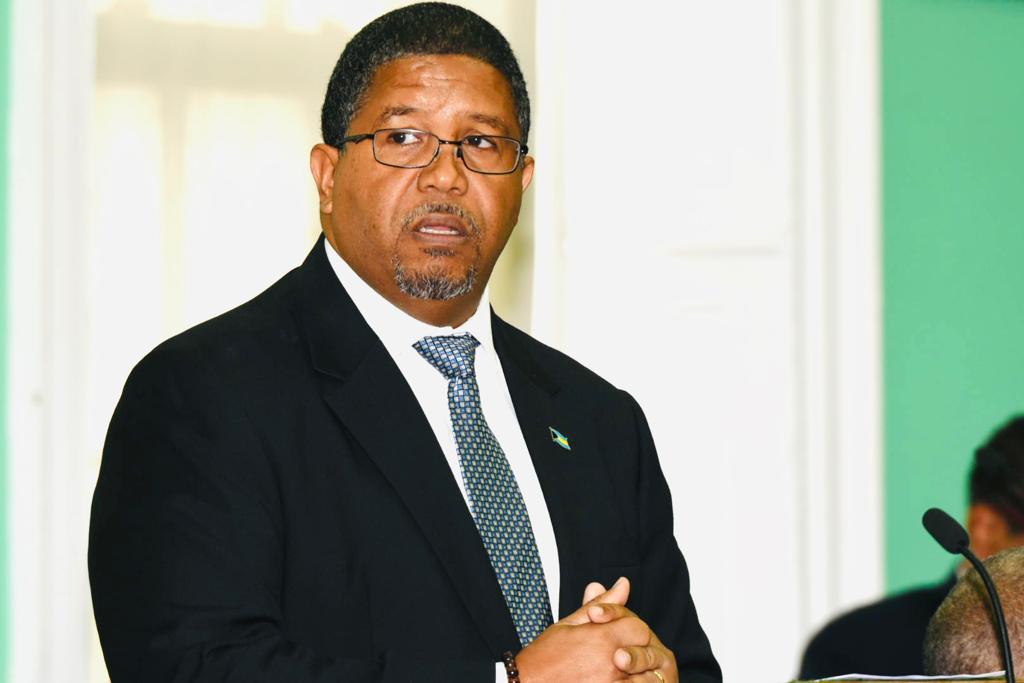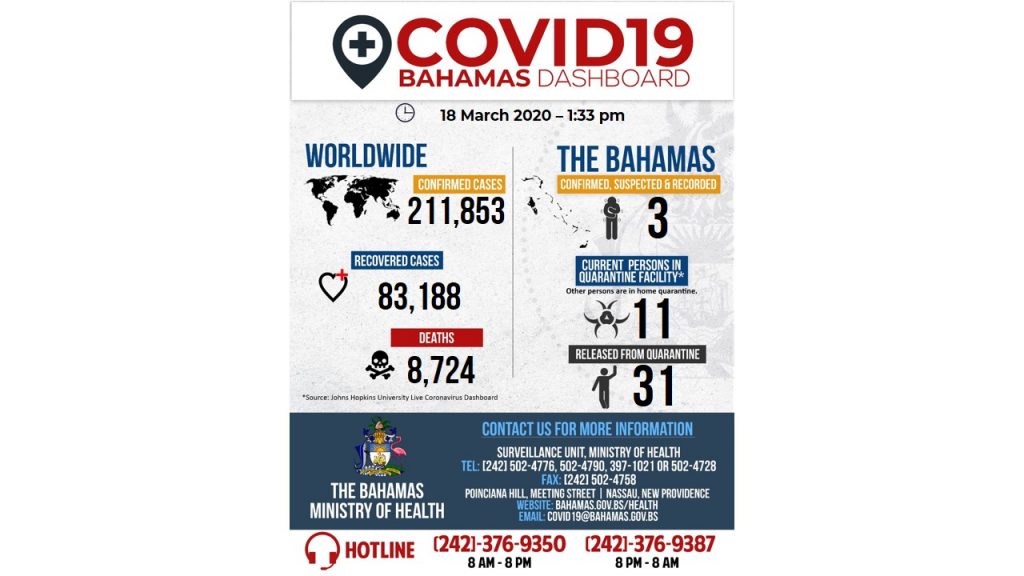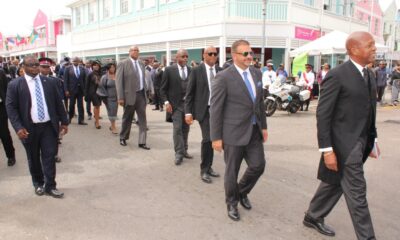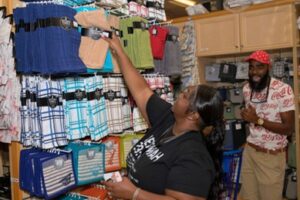Bahamas News
Bahamas Finance forecasts $832 million hit to tourism, in worst case scenario of COVID-19 impact
Published
6 years agoon

#March 18, 2020 — Full Statement by K. Peter Turnquest, Bahamas Deputy Prime Minister & Minister of Finance
INTRODUCTION
Mr. Speaker,
The Coronavirus (COVID-19) has now been declared a pandemic, and concerns continue to intensify as countries around the world take strict and drastic measures to contain its spread. As you know, The Bahamas has now recorded its first domestic case of the coronavirus, and it is likely that numbers will increase.
In response to the developing situation, the Government has implemented border control measures and travel restrictions from South Korea, China, Iran, Europe, the United Kingdom and Ireland. We have placed a ban on public gatherings and closed schools until April 14 to help limit the spread as much as possible and to prevent our public health system from becoming overwhelmed. The Government continues to emphasize the grave importance of heightened personal hygiene, and the need for social distancing, which simply means avoiding crowds, unnecessary social gatherings and close contact with others.
Mr. Speaker,
In the best of times, the Bahamian economy would not escape the effects of a global health crisis like this. However, we are still on the heels of Hurricane Dorian’s crushing impact, which not only increases our vulnerability, but heightens the anxiety felt by the Bahamian people. Economic growth in the short term will be negatively affected by global and domestic developments, and an overall contraction in domestic short-term economic growth is inevitable. Many people are understandably afraid, but I want to reassure Bahamian families that we will get through this challenge together, healthy, stable and strong.
When faced with crisis situations, such as the Coronavirus, good and open communication and collaboration with stakeholders are important building blocks to preparing an effective and well-considered response that delivers the best results for the public at large. I am indebted to industry representatives from the banking community – the Bahamas Chamber of Commerce, the Bahamas Institute of Chartered Accountants, and other respected Bahamian economists from the University of The Bahamas and elsewhere – who responded to my invitation to provide feedback on the Ministry’s initial economic modelling. They provided insightful recommendations on the ways the Government could alleviate the concerns of Bahamians impacted by the virus.
I am also grateful to the Shadow Minister of Finance, Mr. Chester Cooper, for graciously taking the time to meet with the Ministry of Finance and for the input he provided to our toolkit of possible actions. Several of his recommendations have been incorporated.
PRIORITIES FOR GOVERNMENT RESPONSE
Mr. Speaker,
These are uncertain and unprecedented times for sure. Nonetheless I encourage Bahamians not to panic or despair. This is a challenge that we can and will overcome together by being disciplined in our individual actions and decisive with our national response. I say this not as a wishful thought. The Government is acting decisively to contain the spread and the fallout effects. Most importantly, we are providing a safety net for people who are directly and indirectly impacted, and for the economy overall.
I will provide the specific details later in this statement; however, let me say up front that securing public health remains our paramount priority, so we are directing additional resources to bolster the public health care system. Lessening the economic burden imposed on individuals, families and businesses is also a top priority, so we are channeling additional allocations for social assistance support, and for temporary unemployment benefits for groups not typically eligible. Minimizing the need for layoffs and shoring up employment retention is a top priority, so we are also directing substantial financial assistance towards small businesses to support them in maintaining their operations. Whatever is takes, we will protect public safety, support the community and secure the welfare of our people.
EXTERNAL ENVIRONMENT & TRAVEL TRADE TRENDS
Mr. Speaker,
These measures are not only necessary from a pure public health perspective, but because the fiscal and economic fallout is real and tangible. No sector is more at risk than travel, and that industry has already taken a major hit. The travel industry is being hardest hit as companies restrict employee trips, airlines reduce flights, major events are postponed/cancelled and would-be vacationers choose to avoid foreign and domestic travel. Because of the issues with cruises, major cruise lines announced on March 13, 2020, a suspension in operations to and from US ports for 30 days. Workers are already facing reduced work weeks and unpaid leave, and businesses across the sectoral spectrum are facing the possibility of reductions in sales, which will impact their ability to maintain employment levels. This sets off a vicious set of consequential prospective impacts, with individuals not being able to afford basic necessities and meet their financial obligations.
All of these developments signal to us the huge exposure our economy faces from the spread of the virus. We earn the bulk of our foreign exchange from tourism, which accounts for an estimated 40% of our gross domestic product and just under 50% of direct employment. According to the Ministry of Tourism, preliminary data show a decline in stopovers of 12.5% for January and 26.5% for February, 2020 as capacity in Abaco and Grand Bahama remains largely constrained. Although cruise visitors increased by 11.3% in January, this was largely on account of a 77.9% gain in arrivals to the cruise lines’ private islands as such arrivals to Nassau/Paradise Island contracted by 20.4%.
ECONOMIC MODELLING TO ASSESS THE IMPACT
Mr. Speaker,
In keeping with our responsibility for sound governance, the Ministry of Finance undertook to model assumptions on the likely impact of the Coronavirus over the next four-month period to mid-July 2020. We ran three scenarios – low, medium and high impact – based on assumptions of varying degrees of losses for tourist arrivals over a four-month period. The projections produced by these scenarios are by no means precise and all-encompassing, as the fallout in tourism will have a cascading impact on a number of other sectors within the domestic economy. However, the outcomes for each scenario within this preliminary assessment will help us to adopt a reasonable and responsible approach to contingency planning.
While the total economic impact could be as low as $258 million over the next four months to June 2020, we are inclined to focus on the high impact scenario, which assumes 100% loss of cruise visitors and 80% of stopover visitors. In fact, recent developments in the industry would suggest a titling of the possible actual outcome to this extreme scenario, which could result in a total economic loss, including additional public sector spending requirements, of as much as $1 billion. Of this total, a dominant $832 million decline is projected for lost tourism related expenditure as a result of the reduced visitor count.
The direct hit on Government revenue is placed at an aggregated $108 million—$48 million for direct border taxes paid by visitors, and a total of $60 million for potential VAT and imports duty losses. The expenditure requirements could reach $49 million, of which we are funding $10 million from dormant account fund. These resources would be used to address the health and social requirements arising from potential cases of the virus and dislocations associated with job losses and the need to support small businesses.
Mr. Speaker,
To provide more context regarding our assessment, the economic impact of the coronavirus is rippling through the United States, our main trading partner, and across the world. Financial markets are adversely impacted as investor confidence is shaken and heightened concerns about disruptions in supply chains and interruptions in the conduct of business all suggest the possibility of a global recession, which will certainly have implications well into the upcoming fiscal year beginning in July 2020.
Mr. Speaker,
Persons are reasonably concerned about the impact of COVID-19 on the supply of goods coming into the country: Food, in particular. We recognize the risks posed by major disruptions in the supply chain as they can lead to critical shortages at a time when persons are already stressed. However, we must be mindful, because these risks can be exacerbated by panic buying and hoarding, which can fuel a perception that shortages exist.
I would like to be very clear: as the Prime Minister advised the country yesterday, the Government has been in touch with the major domestic importers and distributors of goods We get relevant updates on their supply operations through the National Coordinating Committee for COVID-19 that reports to the office of the Prime Minister. As of now, food importers and distributors advised that they have seen no major disruption in their supply chains and goods continue to come into the country uninterrupted. While new protocols have led to some delay in the shipment of goods, supply chains remain in good standing.
I wish to assure the public that we will continue to monitor this carefully, but there is no need to hoard large quantities of goods or be concerned about the prospect of shortages of necessary items.
The Government has strongly cautioned businesses against inflating prices. We are closing monitoring the retail sector to mitigate the practice of price gouging. We are also encouraging wholesalers and retailers to consider limits on the amount of essential supplies that one customer can buy to help guard against the hoarding of goods, and to ensure there is a stockpile of at least three months of essential items.
Mr. Speaker,
The projected contraction in tourism activity will inevitably have an adverse impact on The Bahamas’ foreign exchange reserves position, which stood at a healthy $2,030 million at mid-March 2020. Based on preliminary projections, external reserves could decline by some $900.0 million by end-2020. Under this scenario, the country would still have a manageable level of foreign reserves. However, the Central Bank will continue to monitor and judiciously manage the reserve holdings. The Ministry of Finance will support the measures that the Central Bank adopts to ensure that our foreign reserve holdings remain adequate for our ongoing financial and commercial needs.
POLICY MEASURES TO RESPOND TO COVID-19
Mr. Speaker,
The Government has adopted a package of policy measures to deal with the tremendous economic impact of COVID-19 that is already starting to be felt as hotel occupancies have fallen, as cruise ship arrivals are on a 30-day hiatus, and as hotel workers are being asked to take unpaid or vacation leave. These provisions have been put in place first and foremost to protect public health. They will also provide a safety net for individuals as we ride out this turmoil together.
- The Minister of Health will expound on the health-related efforts to detect, contain and prevent the spread of COVID-19. However, in addition to the nearly $5 million we have already earmarked for healthcare response, we are allocating up to an additional $11 million to cover detection, isolation, treatment and other COVID-19 mitigation activities.
- We are setting aside $4 million to provide food assistance and social support for displaced workers directly impacted by the virus, through the Ministry of Social Services. These food assistance vouchers, of $100 every second week will be targeted primarily to persons within the hospitality industry who are facing reduced work weeks. This allocation will allow for up to eight weeks of benefit payments but may be adjusted according to need
- The Government is allocating $10 million to provide for a temporary unemployment benefit, administered through the National Insurance Board, for self-employed persons working in the tourism industry. Self-employed persons, such as straw vendors, tour operators, Jet Ski operators, do not ordinarily qualify for the National Insurance unemployment benefit as part of their benefits package. However, the Government is making a special accommodation for those self-employed individuals in the tourism industry, given the unprecedented COVID-19 impact.

For persons in this category, the Government will offer a sponsored unemployment assistance of $200 per week, for up to eight weeks. To qualify, these self-employed persons must be currently registered with NIB or they must register at the time of application for this benefit. The time frame for this benefit may be adjusted according to need.
- Under the normal provisions of the NIB insurance scheme, individuals who contract COVID-19 or are quarantined because of exposure or suspected exposure will be eligible for sickness benefits. And, individuals who are temporarily laid off because of the economic impacts of COVID-19 will be eligible for unemployment benefits, up to the regular thirteen-week period, if necessary. NIB published information on this yesterday to remind persons of these benefits already available to them under the NIB programme. The government encourages all persons who are eligible to contact NIB.
- The Government has requested that Water and Sewerage reconnect all recently disconnected services for residential customers to ensure that personal hygiene is not compromised. Further, the government is also directing both Water & Sewerage and BPL to defer payment of bills – for an initial period of three months for residential customers who are diagnosed with the virus, who are in quarantine, or have been laid off. I must stress that this allowance is for this specific group of persons and that it is important that these impacted persons contact BPL and Water & Sewerage to register for this benefit and verify their situation as necessary.
- Ministry has included the Clearing Banks Association in our consultation on the proposed mitigating measures to address the current situation. The banks have reiterated to me their commitment to helping their clients through challenging times. They have advised that if persons are experiencing financial difficulties during this period, that they should contact their banks to understand the options that are available to them, such as payment deferrals, credit limit increases, or other measures to offer temporary relief. As this issue progresses, the banks have stated their intent to offer more tailored products and services to persons who financially are negatively impacted by the economic effects of COVID-19. The banks have however stressed that for now, it is important that clients who – because of their changing circumstances – find themselves in financial duress, that these customers should go in before they fall into arrears so that their specific situation can be assessed and addressed within the range of the banks’ available tools.
- Under the Accelerate the Youth Apprenticeship Programme, we will expand and accelerate training opportunities in the construction trade to support rebuilding efforts nationally.
- The Ministry of Works will reprioritize capital projects to increase the number of quickly deployable small-scale capital works to boost small business activity.
- The Government will accelerate the approvals process for all domestic and foreign capital investments projects currently in the pipeline.
- We will restrict all non-essential expenses including but not limited to travel, and the scale down or postponement of planned events.
FINANCING THE COVID-19 RESPONSE
Mr. Speaker,
We clearly recognize and accept that these measures are merely the phase one response to this situation. The Ministry is continuing to monitor the situation closely and is preparing for the medium- and longer-term plans that will need to accompany a future economic landscape – one that now looks vastly different than it did just four months ago. The Ministry will continue to adjust as circumstances change and will over time speak to the medium- and longer-term plans within the budget exercise and beyond.
As all Bahamians would be aware, the Government is up against substantial fiscal limitations, given its ongoing fiscal consolidation and the additional appropriations that were required for the equally pressing and urgent restoration activities in Grand Bahama and Abaco after Hurricane Dorian. Over the next four months, we expect the new fiscal demands associated with the COVID-19 to exert additional pressure on our anticipated deficit numbers, and we expect the impact will linger into the new fiscal year.
While the extent of the impact of the COVID-19 on the Bahamian economy is still unfolding, the plan is to first utilize our existing contingency reserves and to reprioritize expenditure to remain within the limits of the recently revised borrowing envelope for the current fiscal year. Should it become necessary, the Government could consider among its funding support options, accessing the International Monetary Fund’s non-conditional Rapid Credit Facility—with current eligibility placed at a maximum of $200 million. Simply put, we have no plans to request additional borrowings at this time, as we are diligently managing the country’s debt levels. We will update these projections based on our ongoing monitoring and reassessment of needs.
It is important, however, Mr. Speaker, that Members appreciate that even if the threat subsides over the next three to four months and tourism sector begins to rebound, it is likely that such a rebound will be slow and measured. Thus, it is important to highlight that our upcoming budget must be informed by a reality that the Government will likely need to continue to use fiscal measures to boost investment and consumption and mitigate against a contracting economy.
Accordingly, while we remained tethered to our commitment to fiscal and budgetary responsibility, we will revisit our fiscal targets within the context of the fiscal responsibility legislation, to determine the need for ongoing flexibility, so that the Government can adequately and responsibly respond to the emerging social, investment and other private support needs to minimize the negative impact on Bahamians and the broader economy.
CONCLUSION
Mr. Speaker,
Together, these measures represent our immediate and short-term push to ensure public safety and to support Bahamians as we navigate this global health crisis together. The Government is taking this situation very seriously and Bahamians should as well. That does not mean panicking or hording supplies. It means being disciplined and following public safety advice relating to personal hygiene and social distancing. It means taking advantage of the assistance programmes made available through employers and the Government, practicing personal budgeting and curtailing discretionary spending, where possible.
Ultimately, the pace of the eventual economic recovery will largely depend on global factors, including how quickly the United States, Europe and China are able to reverse the spread of COVID-19. However, the Government is confident that we have the wherewithal and access to the resources needed to get through this together.
As the situation remains fluid, we are continuing to assess the need for further fiscal and budgetary adjustments to refocus resources on the COVID-19 mitigation initiatives. As I would have mentioned earlier, we have had several consultations with private sector stakeholders to ensure that our national response evolves in an efficient and effective manner. We will also remain committed to ensuring the Bahamian public at large is aware of our response strategy and the measures that are available to them for economic relief.
Mr. Speaker,
As I conclude, I want to reflect on the fact that the COVID-19 pandemic is another sobering reminder of how interconnected we are as a global village. No country can wall itself off from the challenges we face in the 21st century. Whether it is the global climate crisis, global inequality or a pandemic, we have more than enough reminders to know that what others do affects us on our little islands, and what we do, similarly has an impact on the rest of the world. At home and across the world, this is a time for solidarity and unity. The demands of the 21st century require that we harness our collective imaginations and talents to support each other and to solve our common challenges.
There will be many lessons to learn form this episode, but I have no doubt that like Hurricane Dorian, it will serve to demonstrate our strength and resolve as Bahamian people to weather any storm. One of our enduring values will always to be our brother’s keepers, and as Bahamians face the hardships that may come from sickness, dislocations or loss of income, let them be comforted in knowing that they are not alone. Throughout the long history of the history of The Bahamas we have had trying times and hard times. We have endured the scarcities of global wars and the ravages of an untold number of hurricanes. Yet, our faith in our God and our commitment to each other has seen us through. And this remains the source of our resolve and our peace even in the midst of this emerging crisis.
The COVID-19 pandemic and its social and economic effects are a setback for sure; but we know that this too shall pass. Unlike with a hurricane or other natural disaster, our physical economic assets will not be compromised or destroyed. As the pandemic subsides, our beaches, our resorts, our home vacation rentals and the unique warmth and hospitality of the Bahamian people will be here, and they will be intact. They will welcome back thousands of tourists eager once again for sun, sand and sea. These visitors will in the coming months and years have a substantial number of new properties and new features across the country that will generate scores of jobs and entrepreneurial opportunities for Bahamians throughout the archipelago.
So, Mr. Speaker, Bahamians can rest assure that the government is doing and will continue to do what is necessary to weather this particular social and economic storm. And as we emerge as a country on the other side of this pandemic, we remain ever confident of a brighter and more prosperous tomorrow.
Thank you, Mr. Speaker.
Magnetic Media is a Telly Award winning multi-media company specializing in creating compelling and socially uplifting TV and Radio broadcast programming as a means for advertising and public relations exposure for its clients.

You may like
-


CONTRIBUTION TO THE HOUSE OF ASSEMBLY
-


India Feed Mill to save The Bahamas $12.5 Million
-


Bahamas Government to Introduce Measures to Address the High Cost of Living
-


Eleven Months, now NEW COVID death for TCI
-


Covid Entry Vaccine mandate ‘working’ for Turks and Caicos
-


Masks on for Students in TCI, Education extends face covering rule
Bahamas News
Twist To Win Ends in a Grand Style with Four $5,000 Mall at Marathon Shopping Sprees
Published
2 months agoon
December 18, 2025
NASSAU, Bahamas — Caribbean Bottling Company (CBC), local producers and distributors of Coca-Cola and Dasani products concluded their 10 weeklong Twist To Win campaign with four $5,000 Mall at Marathon shopping sprees.
The campaign which was available throughout the entire Bahamas allowed consumers to enter by purchasing a 20oz bottle with a yellow cap from the following brands: Coca-Cola, Coca-Cola No Sugar, Sprite, Fanta Orange, or Fanta Grape. Each yellow-cap had a unique alpha numeric code underneath which they submitted to the Twist To Win WhatsApp number.
from the following brands: Coca-Cola, Coca-Cola No Sugar, Sprite, Fanta Orange, or Fanta Grape. Each yellow-cap had a unique alpha numeric code underneath which they submitted to the Twist To Win WhatsApp number.
With each qualifying purchase, participants residing in The Bahamas were entered to win instant prizes and into a grand prize draw to win one of four $5,000 shopping sprees at the Mall at Marathon.
Participants also enjoyed exciting instant prizes such as: Airpods, JBL Speakers, premium Coca-Cola merchandise, $500 Visa gift cards and Amazon, Spotify and Apple Music digital gift cards.
Out of 76,000 plus submissions, Brian Bethel, Ashia Demeritte, Merlin Adams, and Taraceta Neely won the coveted Mall at Marathon shopping sprees at the following select stores, Kelly’s House & Home, The Sports Center, John Bull, Brass & Leather, and BTC.
Leading up to the grand finale shopping spree, Coca-Cola hosted a Trivia Showdown with the eight finalists to determine the four winners. Finalists were tested on their knowledge of World History, Pop Culture, Caribbean Bottling Company and Coca-Cola Facts!
After a few rousing rounds of trivia, the four winners were declared after each winning their spot in the shopping spree by answering their questions correctly and choosing the “Grand Prize” Coca-Cola labeled bottles at random.
The morning of the shopping spree Coca-Cola gave the winners exclusive access to the Mall at Marathon and its participating stores before their usual operating hours. Grand prize winners were greeted with wide smiles from Coca-Cola brand representatives and morning bites before the big event.
their usual operating hours. Grand prize winners were greeted with wide smiles from Coca-Cola brand representatives and morning bites before the big event.
At the start of the thirty-minute clock the grand prize winners along with each of their Coca-Cola shopping assistants ran to the various stores collecting items in their arms and carts.
Merlin Adams, a husband and father of four was proud to have executed his game-plan at the end of the shopping spree. With toys, a new phone and materials for his home from Kelly’s, Adams felt accomplished in what he gathered.
Taraceta Neely, a winner from Eleuthera collected beautiful bags for herself and relatives from Brass and Leather and Brian Bethel bought matching athletic and outdoor wear from The Sports Center for his family.
The final winner Ashia Demeritte bought linens and household items in addition to a new phone from BTC right in time for Christmas.
Caribbean Bottling Company is proud to share the real magic of Coca-Cola with the grand prize winners and the may instant prize winners across the Twist To Win campaign. For more updates on new products, promotions, and events follow www.cbcbahamas.com.
Bahamas News
The Coca-Cola Art Project Astonishes Art Lovers at The Bahamas Culinary & Arts Festival
Published
2 months agoon
December 18, 2025
NASSAU, Bahamas — Caribbean Bottling Company (CBC), local producers and distributors of Coca-Cola and Dasani products displayed their astonishing Coca-Cola Art Project (CCAP), during Baha Mar’s five-day Culinary & Arts Festival. Earlier this year, Coca-Cola partnered with The University of The Bahamas’ Visual Art and Design Department for a culturally rich art competition. UB’s art students were challenged to create pieces surrounding the theme, Bahamian music.
their astonishing Coca-Cola Art Project (CCAP), during Baha Mar’s five-day Culinary & Arts Festival. Earlier this year, Coca-Cola partnered with The University of The Bahamas’ Visual Art and Design Department for a culturally rich art competition. UB’s art students were challenged to create pieces surrounding the theme, Bahamian music.
As a result, 20 student works of art were made, with four students declared as winners at the CCAP exhibit opening in Baha Mar’s ECCHO: Art Gallery in August. To recreate the culturally stimulating magic felt at the exhibit’s premiere, the CCAP was featured at the FUZE Art Tent during The Bahamas Culinary & Arts Festival.
Nine incredible pieces of art lined the walls of the Coca-Cola Art Project, four of which included the winning pieces from Jhanaisia Cole, with ‘Gaulin Bride’; Alyssa Pinder, with ‘Shotgun Wedding’; Nelson Gray, with ‘Untitled’; and Jaela Bowe, with the piece ‘Whims of Obeah, a Folktail’. Additionally, an intimate listening room was built. It displayed students’ artistic processes, UB Visual Art and Design representatives, and a recap of the exhibit opening for audiences.
with ‘Gaulin Bride’; Alyssa Pinder, with ‘Shotgun Wedding’; Nelson Gray, with ‘Untitled’; and Jaela Bowe, with the piece ‘Whims of Obeah, a Folktail’. Additionally, an intimate listening room was built. It displayed students’ artistic processes, UB Visual Art and Design representatives, and a recap of the exhibit opening for audiences.
Art enthusiasts also enjoyed premium limited-edition CCAP keepsakes at the booth. Journals which featured a collage of all 20 student submissions on the front and back cover, postcards with an art piece on the cover along with the student’s name, title, dimension and materials on the back and pens designed with the CCAP’s dynamic logo.
Throughout the art festival diverse groups of people visited the art tent taking in the displays while enjoying the artistic insights from the listening booth.
listening booth.
Community and culture are always at the forefront of Caribbean Bottling Community, and it was boldly showcased during The Bahamas Culinary & Arts Festival for the third consecutive year.
For more details on the Coca-Cola Art Project, events and new products visit www.cbcbahamas.com today!
Bahamas News
CWS Brings a Galore of Bubbles at Annual Jollification Festival
Published
2 months agoon
December 18, 2025
NASSAU, Bahamas — Caribbean Wines & Spirits (CWS), The Bahamas’ premier wines and spirits distributor delighted Jollification attendees with bubbles from their Bottega and Bouvet Ladubay sparkling wines and Besserat de Bellefon champagne lines.
attendees with bubbles from their Bottega and Bouvet Ladubay sparkling wines and Besserat de Bellefon champagne lines.
Located in the Monument Circle on The Retreat grounds, CWS transformed The Retreat Garden into a lush lounge with Besserat, Bouvet and their latest product addition, Bottega, during the two-day affair.
The festivities kicked off Friday during BNT Member’s Night. Guests enjoyed exclusive offerings from CWS’s catalogue, offered exclusively to members. Complimentary mixes or glasses on the rocks included El Tequileno tequila, Hard Truth whiskey, House of Angostura rum, Cross Keys gin, Nemiroff vodka and a slew of wines such as Fonesca Bin, Bottega and Besserat.
Guests also savored the ‘Jolly Paloma’ cocktail, an instant favorite made with El Tequileno tequila, Schweppes Grapefruit and Domaine de Paris rose wine. To end the night, guests were treated to branded limited-edition wine tumblers as keepsakes.
On Saturday and Sunday, Jollification attendees delighted in glasses or bottles of champagne and sparkling brut or rosé wines while taking in the comfort of the chic lounge. In addition to purchasing bottles for onsite consumption, consumers were also able to purchase bottles as gifts whether for themselves or someone special.
in the comfort of the chic lounge. In addition to purchasing bottles for onsite consumption, consumers were also able to purchase bottles as gifts whether for themselves or someone special.
The sophisticated “bubble lounge” lounge was decked with velvet couches, gold rimmed cocktail tables, blue and pink pillows, and a white floral branded backdrop created for capturing the perfect picture.
Caribbean Wines & Spirits, a historic partner of the Bahamas National Trust was pleased to support Jollification 2025 to kick off the festive season and share their expansive range of spirits.
To keep up to date with all CWS products and events, visit their website at www.cwsbahamas.com today.
TRENDING
-

 News3 days ago
News3 days agoThe Department of Trade, Industry & Fair Competition to Host Export Readiness Workshop Under the theme “Empowering TCI Businesses for Local Growth and Global Markets.”
-

 TCI News5 days ago
TCI News5 days agoExperience Turks and Caicos and Aquila Host Product Development Workshops to Strengthen Sister Islands Tourism




